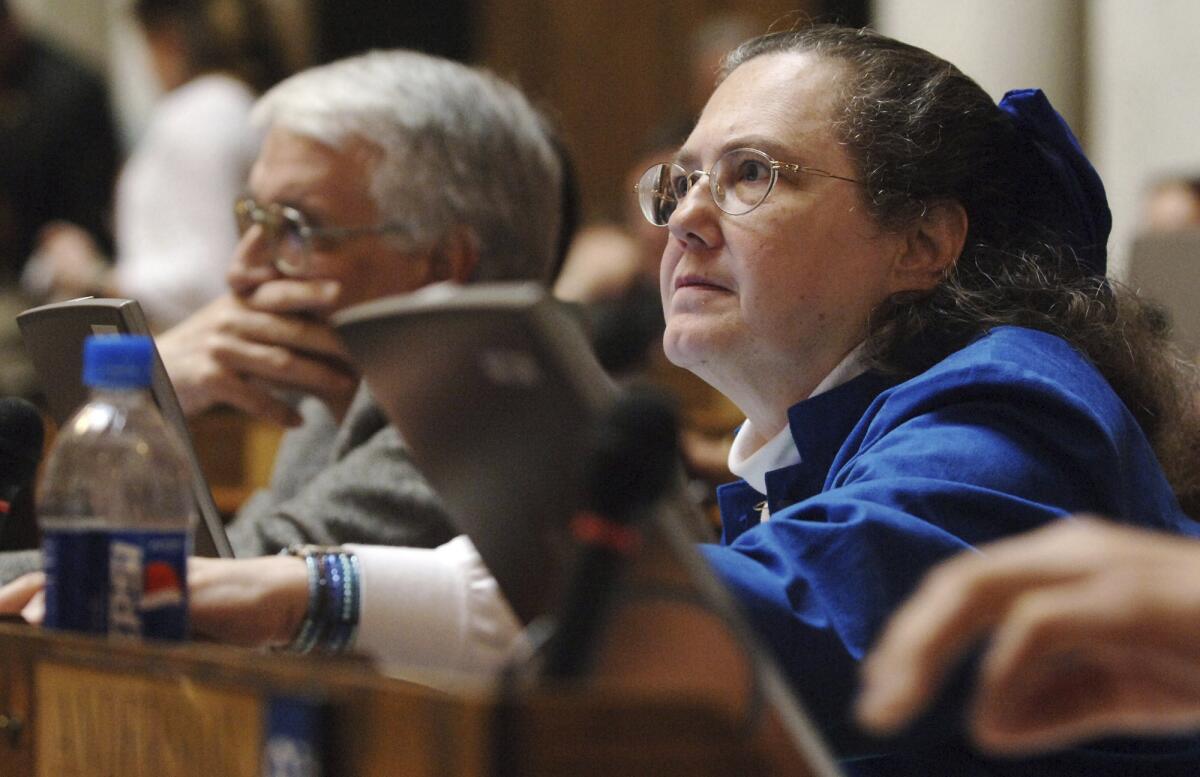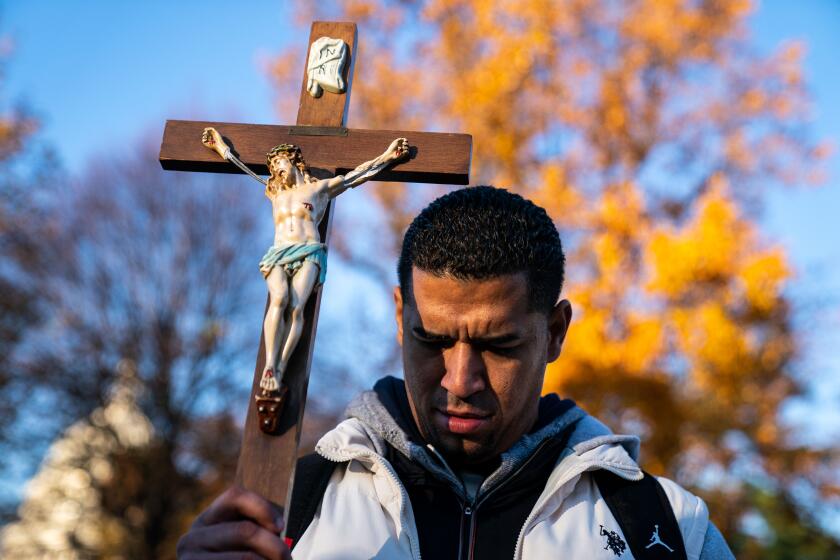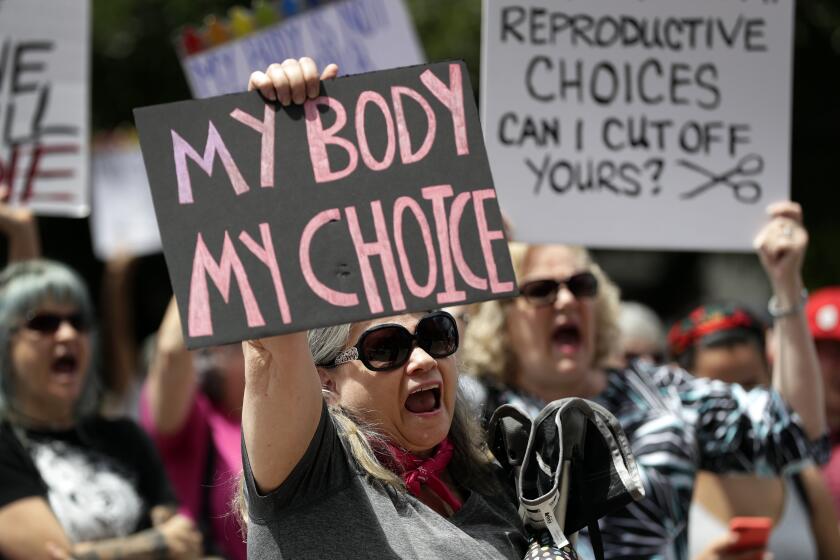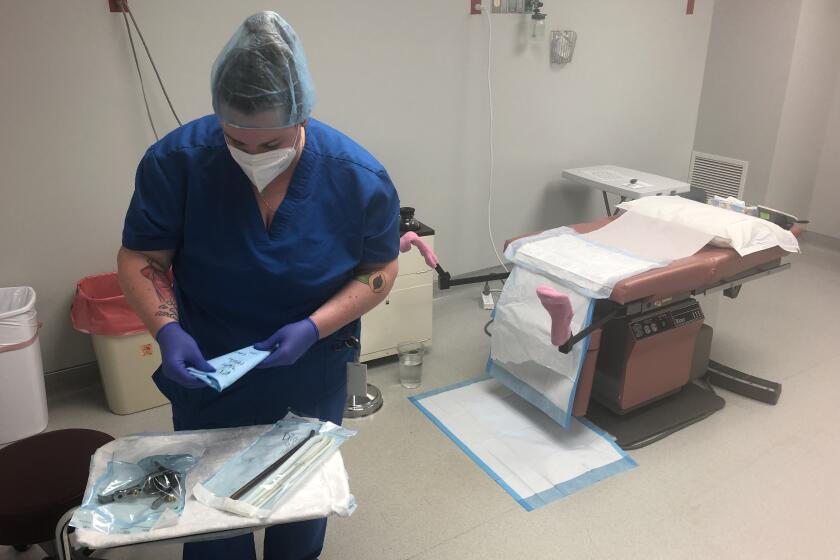West Virginia lawmakers introduce a 15-week abortion ban

- Share via
CHARLESTON, W.Va. — West Virginia lawmakers have introduced a bill to ban abortion after 15 weeks — a proposal nearly identical to the Mississippi law currently under review by the U.S. Supreme Court.
As the nation waits for the court to make a decision later this year in the abortion case that could overturn its landmark Roe vs. Wade decision, at least two states — West Virginia and Florida — have introduced bills mirroring Mississippi’s.
Both the Florida and West Virginia bills would prohibit abortions after 15 weeks except in a medical emergency or in the case of a severe fetal abnormality. Neither would provide exceptions for victims of rape or incest.
Republican Del. Ruth Rowan, lead sponsor of the West Virginia bill, told the Associated Press on Tuesday that West Virginia has an obligation to protect the unborn as “a Christian state where people care about their families and their children.”
Rowan carries two wallet-sized photos around with her in the Capitol: One is of her 17-year-old grandson, a junior at the West Virginia Schools for the Deaf and Blind; the other shows him in a hospital incubator when he was born early — at 28 weeks.
When Rowan’s daughter was pregnant, she said, doctors told her daughter the pregnancy would be risky and gave her some options. Among them, they said, she could end her pregnancy. Rowan said the choice was clear. Years later, the family is grateful she decided to keep him.
“He’s our miracle. He’s why I’m so committed to what I’m doing right now,” Rowan said, speaking through tears during an interview on the House floor. “Life is precious, and we need to respect that.”
Supreme Court’s conservatives justices may have the votes to limit abortion to the first 15 weeks of a pregnancy or overturn Roe vs. Wade entirely.
Rowan said adoption is always an option for women who don’t want to be parents, saying “God has a reason for all of our children.”
Like Mississippi, there is only one facility in West Virginia’s state capital that performs abortions. That’s down from five abortion-providing facilities in West Virginia in 2014, according to the Guttmacher Institute.
Katie Quinonez, executive director of Women’s Health Center of West Virginia — the state’s sole facility currently performing abortions — said the legislation would make abortion harder to access in a state where such access is already severely limited.
U.S. health regulators are lifting long-standing restrictions on how women obtain the abortion pill.
Current law in West Virginia prohibits abortions after 20 weeks and requires women to undergo state-directed counseling and wait 24 hours before the procedure is provided. Parents must be notified before a minor receives an abortion.
As it is, women have difficulty making the trek to Charleston to have an abortion before 20 weeks because West Virginia is a rural state without access to robust public transportation, according to Quinonez. Further restrictions would mean hundreds of people would have to travel out of state for abortion care, she said.
“Abortion bans, by default, are racist, are sexist, are rooted in white supremacy, particularly the exploitation of Black women and controlling women’s bodies and decisions,” she said.
While other states restrict abortion and the Supreme Court weighs Roe vs. Wade, California is preparing to serve the country’s abortion patients.
Quinonez said abortions restrictions fall hardest on people who “are already marginalized by our healthcare systems.” She cited people of color, young persons, low-income earners and people who live in rural areas.
“Our legislators should be working to expand access to healthcare for those marginalized folks, not take their healthcare away,” she said.
Quinonez said she had two abortions in West Virginia — one when she was in high school at age 17 and the other at age 22.
During her first pregnancy, she was dating an older man who was emotionally abusive. She wasn’t able to get her abortion until after 15 weeks. She said she had to try to save money from her part-time pizzeria job to pay for the procedure.
Propelled by a very restrictive abortion law, Texas women are traveling farther afield for abortions.
“That’s why this 15-week ban is particularly upsetting, because I just remember myself as a teenager and how daunting that would have been to have been told, ‘Well, you have to travel somewhere out of state to get the care that you need,’” she said. “I knew that I did not want to be a parent.”
West Virginia’s abortion bill has cleared the House health committee and will go to the judiciary committee. If it passes the judiciary, it will go to the full House.
If Roe vs. Wade is overturned, at least 26 states are expected to have abortion restrictions quickly go into effect or pass new ones, said Kristin Ford, the vice-president of communications and research for NARAL Pro-Choice America.
More to Read
Sign up for Essential California
The most important California stories and recommendations in your inbox every morning.
You may occasionally receive promotional content from the Los Angeles Times.

















